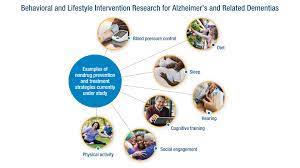Alzheimer’s disease is a formidable challenge that affects millions worldwide. This progressive neurodegenerative disorder not only impacts the individuals diagnosed but also places a significant burden on their families and caregivers. In this article, we delve into the intricacies of Alzheimer’s, exploring effective prevention and care strategies to enhance the quality of life for those affected.
Introduction
Understanding Alzheimer’s disease is crucial in developing preventive measures and effective care strategies. As we navigate through the complexities of this condition, we’ll uncover actionable steps that can be taken to reduce the risk of Alzheimer’s and improve the overall well-being of individuals living with the disease.
Understanding Alzheimer’s Disease
Alzheimer’s disease is characterized by the gradual deterioration of cognitive functions, leading to memory loss, impaired reasoning, and changes in behavior. It typically progresses through distinct stages, each presenting unique challenges for both patients and their loved ones.
Risk Factors for Alzheimer’s
Age and genetic predisposition play significant roles in Alzheimer’s, but lifestyle factors also contribute. We explore the various risk factors, shedding light on how choices in diet, exercise, and overall well-being can influence the likelihood of developing Alzheimer’s.
The Role of Diet in Alzheimer’s Prevention
A nutritious diet is a cornerstone of brain health. We examine specific foods and nutrients that promote cognitive function and discuss dietary changes that may contribute to Alzheimer’s prevention.
Physical Activity and Brain Health
Exercise has far-reaching benefits for the body and mind. In this section, we explore the relationship between physical activity and cognitive health, offering practical recommendations for incorporating exercise into daily life.
Mental Stimulation and Cognitive Exercises
Keeping the brain active through mental stimulation is crucial for preventing cognitive decline. We discuss the importance of engaging in cognitive exercises and provide examples to stimulate the mind.
Social Engagement
Maintaining social connections is more than just a social activity—it’s a key component of mental health. We explore the impact of social engagement on Alzheimer’s prevention and provide strategies to stay connected.
Quality Sleep and Alzheimer’s Prevention
Sleep is essential for overall well-being, including cognitive function. We delve into the connection between sleep quality and Alzheimer’s, offering tips for establishing healthy sleep habits.
Stress Management
Chronic stress has been linked to various health issues, including Alzheimer’s. We discuss the importance of stress management and share effective techniques to reduce stress and promote brain health.
Regular Health Check-ups
Monitoring overall health is crucial for early detection of cognitive decline. We emphasize the significance of regular health check-ups in identifying potential issues before they escalate.
Medications and Treatments
While there is no cure for Alzheimer’s, certain medications and treatments can help manage symptoms. We provide an overview of available options and their respective benefits.
Caregiver’s Role in Alzheimer’s Care
The role of caregivers is pivotal in providing support and comfort to those with Alzheimer’s. We explore the challenges faced by caregivers and offer valuable resources to aid them in their crucial role.
Technology and Innovations in Alzheimer’s Care
Advancements in technology play a significant role in improving the lives of Alzheimer’s patients. We discuss the latest innovations and how technology can be utilized for enhanced care and support.
Personal Stories and Insights
Real-life stories from individuals impacted by Alzheimer’s provide a personal touch to the article. Their experiences, challenges, and lessons learned offer valuable insights for readers facing similar situations.
Conclusion
In conclusion, the prevention and care strategies discussed in this article are vital for addressing the challenges posed by Alzheimer’s disease. Taking proactive measures, incorporating lifestyle changes, and staying informed can make a substantial difference in enhancing the quality of life for both individuals at risk and those already diagnosed.
FAQs
- Is Alzheimer’s preventable?
- While there’s no guaranteed prevention, adopting a healthy lifestyle can lower the risk.
- What role does genetics play in Alzheimer’s?
- Genetic factors can contribute, but lifestyle choices also play a significant role.
- Are there specific foods that can help prevent Alzheimer’s?
- Certain foods rich in antioxidants and omega-3 fatty acids are beneficial for brain health.
- How can caregivers cope with the challenges of Alzheimer’s care?
- Support groups, respite care, and self-care are crucial for caregivers.
- What is the importance of early detection in Alzheimer’s?
- Early detection allows for timely interventions and better management of symptoms.
